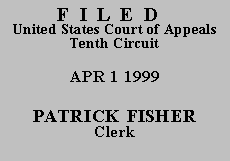

| UNITED STATES OF AMERICA,
v.
FRANK DORMAN |
No. 98-4126
(D.C. No. 97-CR-317-B) |
Pursuant to a plea bargain, Dorman pled guilty to one count of theft of government property and the remaining four counts against him were dismissed. The district court sentenced Dorman to twelve months in prison followed by three years of supervised release. Although the court denied Dorman's motion for a downward departure for medical reasons, it directed that Dorman be incarcerated in a facility equipped to handle his health problems.
Section 5H1.4 of the Sentencing Guidelines provides that "an extraordinary physical impairment may be a reason to impose a sentence below the applicable guideline range; e.g., in the case of a seriously infirm defendant, home detention may be as efficient as, and less costly than, imprisonment." The district court's refusal to grant such a departure does not confer appellate jurisdiction unless the district court "erroneously interpreted the Guidelines as depriving it of the power to depart based on the proffered circumstances." United States v. Castillo, 140 F.3d 874, 887 (10th Cir. 1998) (citation omitted).
The record in this case indicates that the district court was aware of its discretion to depart downward from the Guidelines, but concluded, after hearing argument regarding Dorman's condition and the existence of prison facilities sufficient to treat his health problems, that Dorman was not entitled to a downward departure under U.S.S.G. § 5H1.4. Moreover, "[i]f the record is ambiguous concerning the district court's awareness of its discretion to depart downward, we presume the court was aware of its authority." United States v. Nelson, 54 F.3d 1540, 1544 (10th Cir. 1995) (citing United States v. Rodriguez, 30 F.3d 1318, 1319 (10th Cir. 1994)).
AFFIRMED. Counsel's motion to withdraw is GRANTED. The mandate shall issue forthwith.
ENTERED FOR THE COURT
Carlos F. Lucero
Circuit Judge
*.The case is unanimously ordered submitted without oral argument pursuant to Fed. R. App. P. 34(a)(2) and 10th Cir. R. 34.1(G). This order and judgment is not binding precedent, except under the doctrines of law of the case, res judicata, and collateral estoppel. The court generally disfavors the citation of orders and judgments; nevertheless, an order and judgment may be cited under the terms and conditions of 10th Cir. R. 36.3.